Adil Najam
Other posts in this series for March 23, 2007 – here and here.
March 23 commemorates the passage of what was originally the ‘Lahore Resolution’ (Qarardad i Lahore) and later became better known as the ‘Pakistan Resolution’ (Qarardad i Pakistan). If there is a single most important founding document of Pakistan, it has to be this Resolution passed at the annual session of the All India Muslim League at its 1940 meeting (22-24 March) at Minto Park (now called Iqbal Park), Lahore (by the way, what a wonderful idea – for political parties to have annual, open, meaningful, annual sessions where real decisions are taken in a transparent and democratic manner!). In 1941, this Lahore (Pakistan) Resolution became part of the Muslim League constitution and in 1946 it became the basis of the demand for Pakistan.
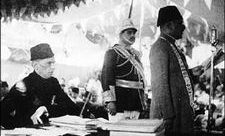
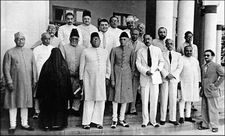
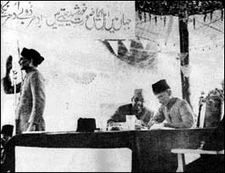
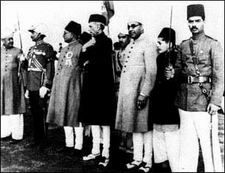
Most Pakistanis know what the resolution says; or, at least we think we do; in most cases rightly so. But because we are so very sure that we know what it says, we usually do not take the time to actually read it. Maybe we should. And there cannot be a better day to do so than today.It is, like many of the most important documents in history, a fairly short text. I reproduce it here in full. The first two paragraphs are contextual related to the then discussions on federation within the Government of India Act 1935. The third and the fourth paragraphs are the key operational content which is usually cited in textbooks. However, my view is that the final short paragraph is also key; especially in that it talks in the plural about “respective regions” (as do previous paragraphs).
While approving and endorsing the action taken by the Council and the Working Committee of the All-India Muslim League, as indicated in their resolutions dated the 27th of August, 17th & 18th September and 22nd of October, 1939, and 3rd of February, 1940 on the constitutional issue, this Session of the All-India Muslim League emphatically reiterates that the scheme of federation embodied in the Government of India Act 1935, is totally unsuited to, and unworkable in the peculiar conditions of this country and is altogether unacceptable to Muslim India.
It further records its emphatic view that while the declaration dated the 18th of October, 1939 made by the Viceroy on behalf of His Majesty’s Government is reassuring in so far as it declares that the policy and plan on which the Government of India Act, 1935, is based will be reconsidered in consultation with various parties, interests and communities in India, Muslims in India will not be satisfied unless the whole constitutional plan is reconsidered de novo and that no revised plan would be acceptable to Muslims unless it is framed with their approval and consent.
Resolved that it is the considered view of this Session of the All-India Muslim League that no constitutional plan would be workable in this country or acceptable to the Muslims unless it is designed on the following basic principles, viz., that geographically contiguous units’ are demarcated into regions which should be constituted, with such territorial readjustments as may be necessary that the areas in which the Muslims are numerically in a majority as in the North Western and Eastern Zones of (British) India should be grouped to constitute “independent States” in which the constituent units should be autonomous and sovereign.
That adequate, effective and mandatory safeguards should be specifically provided in the constitution for minorities in these units in the regions for the protection of their religious, cultural, economic, political, administrative and other rights and interests in consultations with them and in other parts of (British) India where the Mussalmans (Muslims) are in a majority adequate, effective and mandatory safeguards shall be specifically provided in constitution for them and other minorities for the protection of their religious, cultural, economic, political, administrative and other rights and interests in consultation with them.
This session further authorises the Working Committee to frame a scheme of constitution in accordance with these basic principles, providing for the assumption finally by the respective regions of all powers such as defense, external affairs, communications, customs and such other matters as may be necessary.
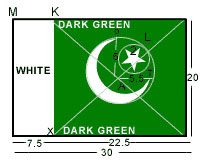 Apart from the fact that the Resolution talks clearly about “respective regions” (words that have import in the context of the events of 1971), I find the 4th paragraph particularly important. The complex structure of the language notwithstanding, the sentiment is clear as is its emphasis on the rights of minorities – not just of Muslims as a minority but of non-Muslim minorities in areas where they envisaged Muslim sovereignty. In such a short document, for the founding fathers to have devoted so much space to this issue would suggest that they – having lived as a minority themselves – considered the subject of minority rights to be of particular importance. This is one of the many areas where we were unable to live up to their aspirations.
Apart from the fact that the Resolution talks clearly about “respective regions” (words that have import in the context of the events of 1971), I find the 4th paragraph particularly important. The complex structure of the language notwithstanding, the sentiment is clear as is its emphasis on the rights of minorities – not just of Muslims as a minority but of non-Muslim minorities in areas where they envisaged Muslim sovereignty. In such a short document, for the founding fathers to have devoted so much space to this issue would suggest that they – having lived as a minority themselves – considered the subject of minority rights to be of particular importance. This is one of the many areas where we were unable to live up to their aspirations.




















































Samdani, thanks for your response. If I understand you correctly (in conjunction with a comment from Adil in the aftermath of the Samjhauta Exp bombing), Pakistanis dislike the very idea of discussing or bringing up anything related to partition. Fair enough, I guess it comes across as questioning your separate existence.
I’ll leave you with an (possibly imperfect) analogy as to why Indians see it as an obvious thing to discuss: say your spouse decides he/she has to leave you for a better life. Even if you respect their choice, how likely is it that you will not want to know or understand why they wanted to leave you in the first place? Unless you kicked them out, won’t you entertain the belief that the differences could be worked out? At the least, wont you want to understand the differences? Want to say, it wasn’t about me? Will you be able to say they know best, I’ll never even try to rationally understand their decision? Or is any questioning on your part only an unstated intent of demolition of their individuality?
(Just to be clear, I’m aware the analogy isn’t perfect, just couldn’t think of something better).
If Pakistanis really believe that there is such a fundamental basis for their separate existence (beyond the realm of questioning) I can’t help think that it shortchanges the hundreds of years of Mulsim rule in the subcontinent. Did the great Mughals then fail to establish any kind of ‘Indian’ culture? Any kind of common ground, that their descendants can only survive under a separate umbrella?
Anyhow, you must be correct in that this forum must have discussed such topics by the bushel in the past, so please ignore this message, if you feel it goes down the same road.
Here’s one reason why our country has so many problems. Here’s a recent speech (crazy rant a-la Howard Dean?) by terrorist-in-chief Altaf Hussain. For some reason he’s trying to stress that the name Pakistan is not even in the resolution and somehow that means what?
http://stopdesi.com/view_video.php?viewkey=9311ef5 b5c3003946c48
MQM supporters need to watch the above and slap themselves afterwards.
Mahi, at least on my part, the disinclination to go down this line of conversation is that we have had these so many times on this blog and elsewhere and I am not sure where they lead us.
If you go back and see all the posts like this here, on 14 Aug etc, you will see that our Indian freinds (the nice ones, not the shouting ones) always turn them into conversations about the rationale of Pakistan, how it is different ffrom India, and by inference whethere it is a rationale that makes sense. Obviously, they have not cme to terms with the reality of Pakistan. Its here. Why does one have to defend why its here. Even those of us who see many problems in it never question its existence or the need for its existence. The notion that maybe, just maybe, somehow things coudl have been different and it should not have happened is not just a useless discussion, its an offensive discussion for us. I realize that it is not meant to be, but it is.
By the same token, I have realized that many things we say are offensive to our Indian colleagues. Like when some of us confuse ‘Indian’ with ‘Hindu’.
Again, there is NOTHING at all offensive in what you wrote. I think you are very polite and pertinent in your messages, and I thank you for that.
Hi Critic – thanks for answering my query. It strikes me that I got just one response. Is it because people are wary of getting into a shouting match with an Indian? Or is it that there is an inherent disinclination to entertain an Indian on a Pakistani forum? Guess we’ll never know…
You are right about what you say (in your first point). I too am one who entertains the ‘why couldn’t we be together’ notion. And as you rightly suspect, its a good-will sentiment. It is certainly not an expression of resentment or an indication of stealth hopes to take over Pakistan. In truth, in most cases, its the desi way of encapsulating good-will. One of the deeper reasons this sentiment exists amongst Indians, perhaps, is that we dont really have a TRUE appreciation of why Pakistanis wanted a seperate nation – beyond the generic idea of a seperate-homeland-for-Muslims. Or maybe Indians just can’t accept or undersand that someone doesn’t want to live with them? Anyway, Indian school history does not focus in detail on these events. They are very anesthetised (possibly a legacy of early years of Nehruvian secularism). If I’m any indication, for many Indians of my generation its a mystery why citizenry of Pakistan feel they couldn’t/can’t live with us.
Anyway, from the Indian side, we obviously dont realise that such an innocuous sentiment has the potential to cause so much heartache. Mostly people think we never attacked them, never showed open aggression, why dont they trust us? Rightly or wrongly, Indians have the sense that their nation is not an aggressive one.
Your second point — true, Indian administartion behaves quite immaturely in dealing with other states of the subcontinent. This irritates me quite a bit. I wish we were more sensitive and less haughty. That said, think about this: Nepal is largely Hindu-Buddhist, shares even closer cultural affinity with India than Pakistan, many Nepalis work in the Indian army, is way smaller than Pakistan, is stuck with India for any realistic contact with the outside world. But it occurs to me that there has never really been a ‘takeover’ effort by us or even a covert threats administered to annex Nepal? If you think Nepal has sacrified some autonomy for this, think of Sri Lanka. Inspite of the whole Tamil connection and cultural similarity, leaving aside the botched peace-keeping effort of Rajiv Gandhi years, Sri Lanka I believe enjoys its own life. I’ve never felt Indian governments tried to bring down SL, so we can ‘reunite’ with them. So while there is merit to your sense that India’s behavior in the subcontinent, governmental interaction-wise, is less than exemplary, I think its counter to the facts that this should lead to notions of national safety for Pakistan. Besides, Pakistan is much much bigger and more visible internationally than every other subcontinental state to be bully-ed around or treated as a satellite by India. Don’t you think?
Adil sb.
You’ve made some excellent points… which need to emphasised… The Lahore Resolutuion translates into this:
1. The idea was not necessarily a unitary state per se but two or more states … which may or may not be within an over all confederation with the rest of India. The language was kept ambiguous by the drafters (notably Sir Zafrullah Khan)i.e. “Independent” and “autonomous” primarily to leave the door for negotiation on these issues, as desired by Jinnah … Bangladesh and Pakistan are put together in one state at Nehru’s insistence… even though Sarat Bose (Netaji’s brother), Suhrwardy and Jinnah had agreed to form an independent Bangladesh in 1947 (Read Shameful Flight by Stanley Wolpert)
2. The protection of minorities is an important point which not only shows the liberal and progressive concerns of Pakistan’s founding fathers- as they were well aware that they were championing a minoritarian demand themselves- but also that they envisaged Pakistan-India relations based on mutual cooperation and aid.
Thus … as Jinnah later described it… Lahore Resolution was a demand by Indians based on the idea that India was for Indians….and that Muslims were as Indian as anyone else – which was why this demand was put forth.